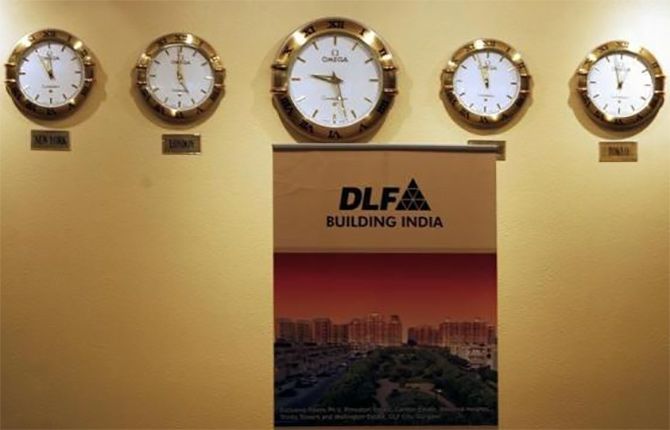 | « Back to article | Print this article |
 Weeks after the Securities and Exchange Board of India (Sebi) barred DLF and six of its top executives from accessing the capital market for three years, mutual funds are citing the regulator’s order to decline the refund of Rs 2,000 crore (Rs 20 billion) invested by the company in their schemes.
Weeks after the Securities and Exchange Board of India (Sebi) barred DLF and six of its top executives from accessing the capital market for three years, mutual funds are citing the regulator’s order to decline the refund of Rs 2,000 crore (Rs 20 billion) invested by the company in their schemes.
The real estate firm has written to the regulator to check if the restricting order applies to its mutual fund investments as well. The matter was mentioned on Wednesday during an appellate hearing in DLF’s plea against the Sebi order.
The hearing also involved a petition by Kimsuk Krishna Sinha, seeking to be made party to the proceedings.
Though Sinha was the original complainant against DLF, he had not been heard before the final order was passed, his counsel argued. The tribunal is likely to decide on both matters on October 30, when it next hears the matter.
The heads of two asset management companies confirmed that mutual funds were awaiting regulatory clarity over redemptions. “We have sought clarification from Sebi regarding this… There had been an order in the past that barred the promoter of a company from all market transactions, excluding mutual fund units. We hope the regulator would soon clarify on this through SAT (Securities Appellate Tribunal).”
The counsel for Sebi on Wednesday sought to seek instructions on the matter and the tribunal gave time until the next hearing.
According to Tejesh Chitlangi, partner at IC Legal, the prohibition on dealing in securities, as pronounced by Sebi, will extend to mutual fund investments as well.
“Mutual fund units, under Section 2(h) of SC(R)A, fall within the ambit of ‘securities’. As the prohibition imposed on dealing in any kind of securities is very widely worded in the order, it is incumbent on an intermediary to take adequate care in dealing with the issue. From a compliance perspective, mutual funds should permit redemption for any of the debarred individual/entity only under the direction of a tribunal/court, or ‘no-objection’ from Sebi,” he said.
Two more lawyers confirmed that mutual funds would be covered under the definition of securities. The Securities Contracts (Regulation) Act on the Sebi website shows that the definition of securities explicitly covers mutual fund units, saying securities include “units or any other such instrument issued to the investors under any mutual fund scheme”.
While SAT asked Sebi and DLF to file replies on Sinha’s petition, DLF also said it intended to seek a complete stay on the Sebi order when the tribunal next heard the matter on Thursday.
The counsel for the company argued before the tribunal that DLF’s plans to raise capital through non-convertible debentures issued to institutional investors had also been hit on account of the order.
The tribunal has not admitted the appeal yet; it will decide on the admissibility after next week’s hearing.
The company’s appeal is against the stock market regulator’s findings that DLF had not made adequate disclosures at the time of its initial public offering in 2007. Besides the company, Sebi had also barred Chairman K P Singh, his son Rajiv (vice-chairman), daughter Pia (a whole-time director), and three other executives — Managing Director T C Goyal, former executive director (legal) Kameshwar Swarup and former MD Ramesh Sanka.
According to the order, it was found that DLF had failed to make disclosures about three of its related companies - Sudipti Estates, Shalika Estate Developers and Felicite Builders & Construction.
Sebi had found this during its probe following a complaint by Sinha, who alleged he had been duped of Rs 34 crore in a land deal involving Sudipti, which was owned by Shalika and Felicite. DLF had not disclosed a First Information Report lodged in this matter.
A former senior Sebi official, who did not wish to be named, said he had received a number of calls from fund houses seeking clarity on the position. He suggested DLF might find relief if the schemes had matured.
“Technically, Sebi’s order means the company cannot transact in any securities and mutual fund units qualify for that. However, if the schemes mature, the fund house concerned will have to pay DLF (because it is payment at maturity, and not through sale of units),” he said.